Ideanomics CEO: Heightened Optimism for West Hartford Project

Audio By Carbonatix
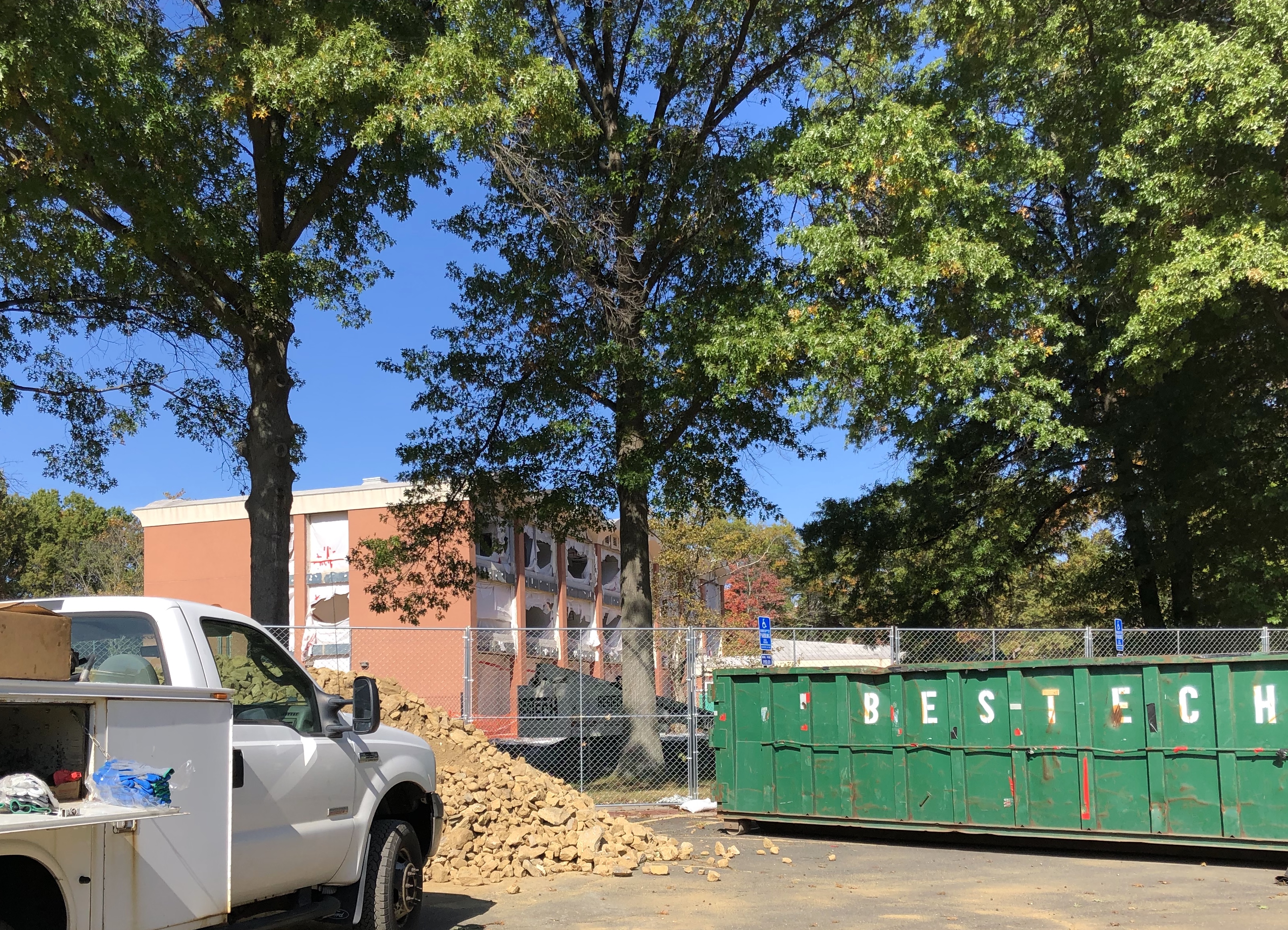
Remediation work is nearly complete on the former UConn School of Social Work building and it will be demolished soon. Photo credit: Ronni Newton
Alf Poor, CEO of Ideanomics, sat down with We-Ha.com to provide updates on the project, and said remediation of buildings on the former UConn West Hartford is well underway and detailed plans will be submitted this fall.
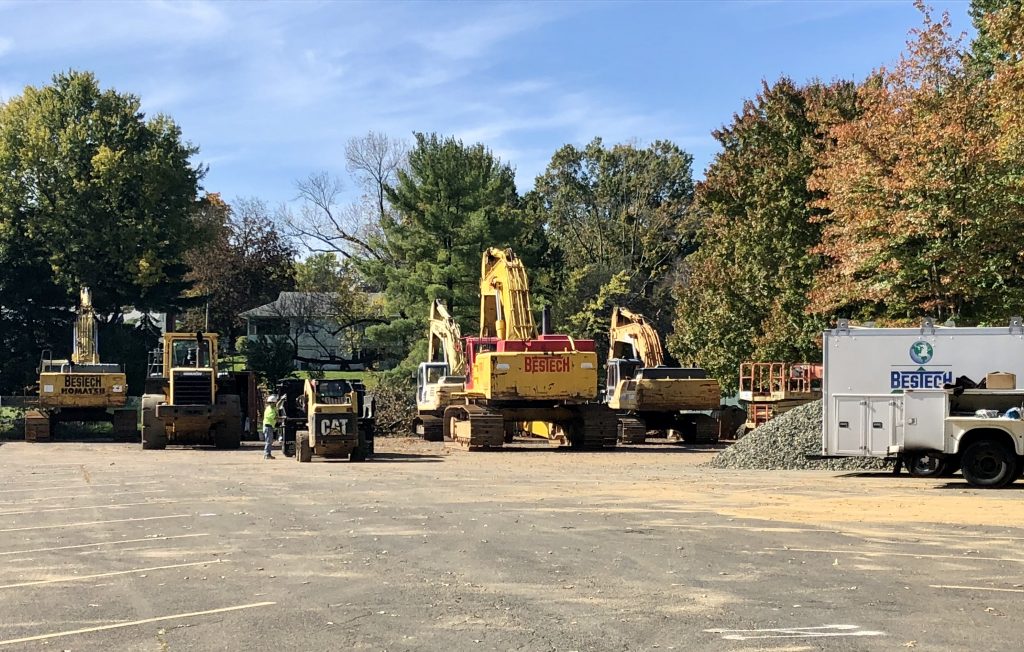
Remediation contractors at work behind the former UConn library.
By Ronni Newton
The CEO of Ideanomics is more excited than ever about the plans for Fintech Village being built in West Hartford.
“We’re ending the year with heightened optimism and knowledge of the path we’re on,” Alf Poor told We-Ha.com in an interview Tuesday.
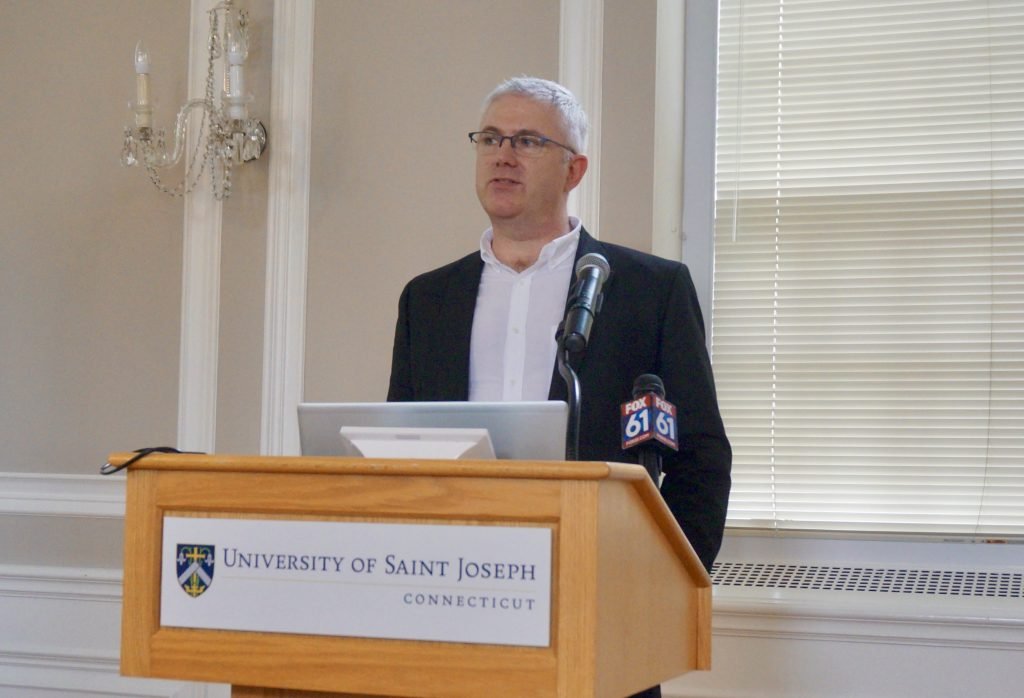
Ideanomics CEO and Fintech Village President Alf Poor. Photo credit: Ronni Newton (we-ha.com file photo)
Poor, the CEO of Ideanomics as well as the president of Fintech Village – the $400-plus million dollar global center for technology and innovation that the company plans to build on the site of the former UConn West Hartford campus – said detailed site plans will be submitted to the town this fall, including a request to have the zoning for the parcel changed. Currently the 58-acre property is zoned single-family residential.
The architectural plans, Poor said, have been modified somewhat from the renderings released during a celebratory press conference in July.
“The height of some buildings will be reduced,” Poor said. “We are taking into consideration the input of neighbors” that was received during an outreach process throughout the summer. The company will be sensitive to concerns about traffic as well as potential problems with wet backyards raised by neighbors.
The art museum, public art installations, and other public amenities are still part of the project, Poor said.
It’s not really visible to casual passersby, but abatement of asbestos and PCBs has been taking place on the site, and the School of Social Work will be demolished very soon, followed by three other buildings. Only the IT building, which is much newer, will be left standing.
“The thoughtful way to remediate was to take the buildings down,” said Poor.
“We are taking extra steps for remediation,” Poor said, including using water to suppress the dust. “It’s the most efficient and cleanest way to get this land remediated for residents, but it’s not the cheapest for us.”
The company doing the remediation has been “stellar,” Poor said, as has the Town of West Hartford.
The entire process has been full of surprises, however, including the discovery that the power to the IT building at some point had been jury-rigged from the library – something that only became apparent when power was being turned off during the remediation in preparation for demolition.
“That’s why there’s lights-out now,” Poor said, including on the walkways throughout the campus.
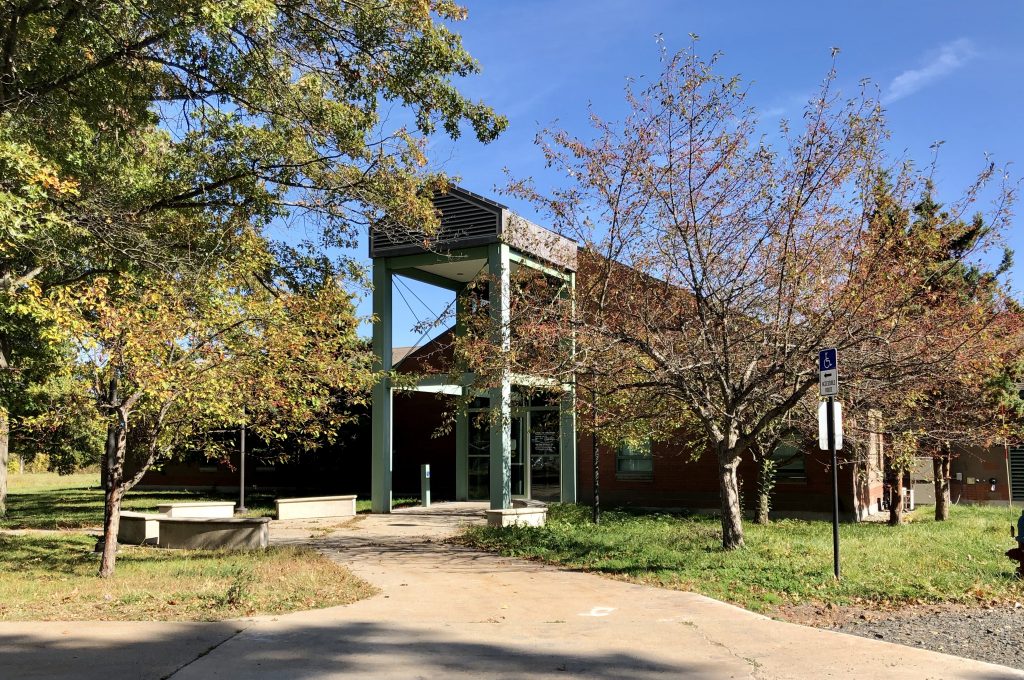
The former UConn IT building will remain, but it currently is without power. Photo credit: Ronni Newton
Ideanomics was planning to approach the town requesting permission to utilize the IT building, for which it has a tenant lined up, but that can’t happen until it gets re-wired. Poor hopes power can be restored before the building needs to be winterized.
Poor is confident that the company has passed many of its toughest hurdles, not only with the remediation but also including a disagreement with the state regarding a $10 million incentive for job creation promised by the Malloy administration, and a requirement for bonding for the remediation, which is costing multiple times more than anticipated.
It may be lights-out now throughout the campus, but Poor said he, and company chairman Bruno Wu, can now see the light at the end of the tunnel.
“We feel better than we have since the announcement of the purchase since now we know what we are dealing with,” Poor said. “Now the forward planning is back underway.”
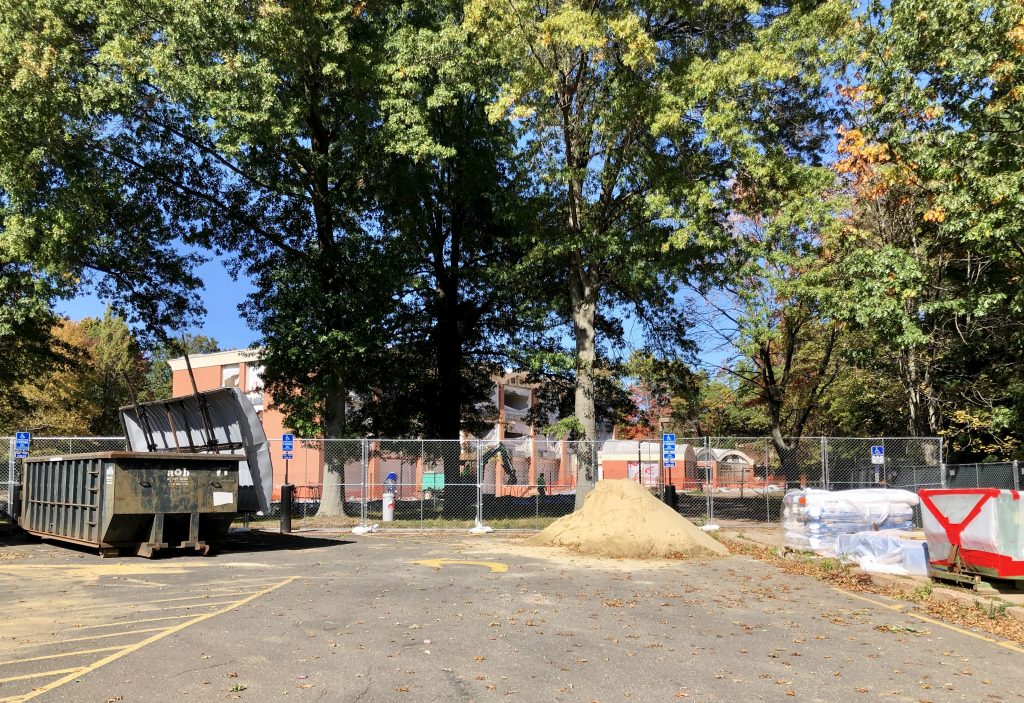
Remediation work is nearly complete on the former UConn School of Social Work building and it will be demolished soon. Photo credit: Ronni Newton
Last year the company was facing what Poor called the “dark cloud of remediation,” and while the work is costing the company much more than anticipated, there remains great excitement about having Fintech Village in West Hartford.
Once the buildings are down, and the approval process with the town is underway, Poor said the major concerns will be phasing the construction of new buildings and bringing them online in a way that continued construction on other structures won’t be an impediment to the completed ones.
Agreements are in place with businesses from throughout the world – some as letters of intent, and others in less formal terms – to locate in Fintech Village, Poor said.
West Hartford, located halfway between financial centers in New York and Boston, is an ideal location for this project.
“They need high-speed data centers, and this looks like an excellent corridor,” said Poor, who is headquartered at the Ideanomics offices in New York. West Hartford is also “nicely placed between Europe and the West Coast – where fintech and the industry are going.
Ideanomics currently has activities taking place in Israel, the U.K., Ukraine, China, “but having it so fragmented is difficult,” Poor said. There is so much regulation surrounding the fintech industry, he said, that it’s a major stumbling block to the success of many start-ups.
There’s currently a team in Ukraine working on a blockchain project, but they really need to understand the regulatory environment to operate in the U.S.
“For us, moving these people. here, giving them access to the regulatory authorities” will make a major difference, said Poor.
While Ideanomics plans to break ground in 2020, “Fintech Village will not make money in 2020,” Poor said. “This is a long-term investment.”
The project carries the weight of Wu’s expectations, and Wu, a Chinese-American billionaire, wants things to happen yesterday, but Poor is more of a realist. He said that the project has moved along faster than others would have, thanks to Wu.
“I don’t want to kill what’s a gift to us – Bruno Wu,” Poor said. Wu’s support and his vision will fuel the success, and in the past 12 months since Ideanomics closed on the property, purchased “as is” for $5.2 million, what many people don’t see is “many miracles have happened.”
Poor sees a bright future for the company, and for the state.
The number of jobs created by Fintech Village – well above the 330 that are part of the state’s incentive package – will be amazing for Connecticut, Poor said.
“These are shaping tomorrow’s economy, jobs Connecticut needs, six-figure jobs,” said Poor. “This is exactly the type of service economy Connecticut needs to build.”
Related stories/more information
UConn turned over the keys to Ideanomics on Oct. 10, 2018.
Like what you see here? Click here to subscribe to We-Ha’s newsletter so you’ll always be in the know about what’s happening in West Hartford!




If the zoning is single family residential and they are investing this much in the property there must be a deal to change the zoning in advance of any public hearings. This is pretty shady for the town to be making back room deals with a company with questionable finances.
I am with Steve on this one. Ideanomics market cap is ~ $175MM, and they are building a $400MM facility in West Hartford, where they were haggling over the first couple million? This emperor has no clothes. Get used to driving by a pile of rubble, let’s get serious about our business partners, this is not a town full of stupid people, or lemmings.
Not only that, the Hartford Business Journal had an article describing the difficult sell with the investors despite Wu and Shane McMahon controlling much of the company’s shares. There was talk of Wu bankrolling the project personally. Sounds like a major conflict of interest when the CEO is lending a public company money.
From the article: “Poor said it was Wu who did the necessary convincing, even offering to cover certain costs himself should the project get too pricey for shareholders.”
Also from the article: “That’s a major reason Poor says he is unconcerned that Ideanomics reported having just $1.1 million in cash and equivalents on hand at the end of June. That led the company to conclude in an SEC filing that there is “substantial doubt” about its ability to continue.”
That quote states the Ideanomics has substantial doubt about their ability to continue to operate.
West Hartford has to do its due diligence and not create a white elephant on the site. The voters don’t want or need a half completed development of this scale.
When Ideanomics agreed to purchase the property, that contract came with a requirement to remediate the contaminants. The only submissions to the town at this point have been for permits for the environmental clean-up. The zoning piece will require a lengthy application process, with public hearing(s) and a Town Council vote. As the zoning authority for the town, Council members are not commenting at all about the project based on advice from the corporation counsel. ~Ronni
Like Blue Back was, this is a done deal. If things don’t go the way Ideanomics wants they will sue and the town will fold. It won’t be the first time, unfortunately.
Prediction: Experts hired by the applicant will tell everyone that there will be no impact on waterways, no impact on traffic. Despite these attestments over the years and steady population in town water problems and traffic worsen persistently. How much will we be spending on the buildup of all the roads to funnel the traffic to the “residential” site?
Please note that the term is “jury-rigged”, not jerry-rigged.
Also, power distribution to a building the size of the IT Building at the UConn WH Campus would not be “jury-rigged”. It was likely intentionally fed from the library for any number of reasons, and this would likely have been apparent to any engineer or facility manager who understands power distribution and took the time to review the actual, installed electrical switchgear at the facility, even if an as-built one-line diagram for the facility did not exist (i.e. due-diligence).
I am assuming the information regarding this “surprise” came from someone at Ideanomics, but to a trained professional it sounds sketchy as hell, and supports the above comments that this company is in over its head (I COMPLETELY hope I am wrong about that FWIW). That said, at least they are getting rid of the hazardous building materials – which is a victory for the Town in itself.
Engineer – Thanks for pointing out the use of the incorrect term. I will change it to jury-rigged ASAP. As for the use of the term, while it was used by someone who was not an engineer, there were apparently no permits obtained and no diagrams indicating that the IT building’s power was tied into the library. The people who are working on the remediation are trained professionals, and I was told that they were surprised at the way the electrical power was run.
How does a town of this size get involved with a company like this ? Clearly many black clouds surrounding who they are and what they do. Now they apparently are looking to sublet out most of the space to other tenants, build housing , build retail/ restaurants. I understand that the town needs continued revenue growth but the town is also short fields, gyms , a dog run, an ice skating rink, and other amenities that towns this size have. The town blasts away at higher taxes anyway from year to year so what difference would it have made if we remediated the land and had built something really exciting for the future of the town. This story has all the makings of a story that will end badly. Thanks
[…] ICYMI, I had a chance to sit down last week with Alf Poor, CEO of Ideanomics and president of Fintech Village, to get an update on the company’s plans for the former UConn West Hartford campus. Click here for details. […]
[…] of asbestos and polychlorinated biphenyls (PCBs) has been taking place on the site for some time, Alf Poor, the CEO of Ideanomics and president of Fintech Village, told We-Ha.com earlier this month, and he noted that the contractor was nearly ready to begin demolition of the School of Social […]